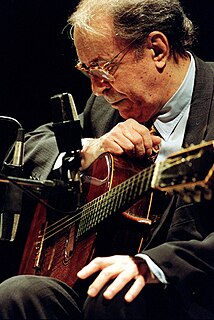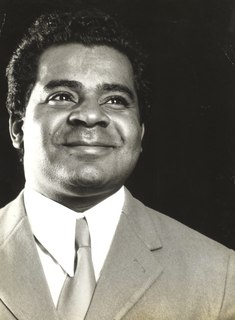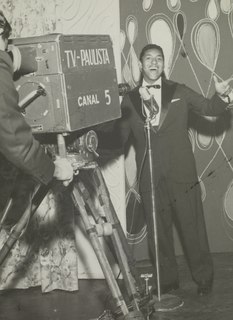Related Research Articles
Bossa nova is a style of samba developed in the late 1950s and early 1960s in Rio de Janeiro, Brazil. It is mainly characterized by a "different beat" that altered the harmonies with the introduction of unconventional chords and an innovative syncopation of traditional samba from a single rhythmic division. The "bossa nova beat" is characteristic of a samba style and not of an autonomous genre.

Antônio Carlos Brasileiro de Almeida Jobim, also known as Tom Jobim, was a Brazilian composer, pianist, guitarist, songwriter, arranger, and singer. Considered one of the great exponents of Brazilian music, Jobim internationalized bossa nova and, with the help of important American artists, merged it with jazz in the 1960s to create a new sound, with popular success. As such, he is sometimes known as the "father of bossa nova".

Stanley Getz was an American jazz saxophonist. Playing primarily the tenor saxophone, Getz was known as "The Sound" because of his warm, lyrical tone, with his prime influence being the wispy, mellow timbre of his idol, Lester Young. Coming to prominence in the late 1940s with Woody Herman's big band, Getz is described by critic Scott Yanow as "one of the all-time great tenor saxophonists". Getz performed in bebop and cool jazz groups. Influenced by João Gilberto and Antônio Carlos Jobim, he also helped popularize bossa nova in the United States with the hit 1964 single "The Girl from Ipanema".

João Gilberto was a Brazilian guitarist, singer and composer who was a pioneer of the musical genre of bossa nova in the late 1950s. Around the world, he was often called "father of bossa nova"; in his native Brazil, he was referred to as "O Mito".

"Garota de Ipanema" is a Brazilian bossa nova and jazz song. It was a worldwide hit in the mid-1960s and won a Grammy for Record of the Year in 1965. It was written in 1962, with music by Antônio Carlos Jobim and Portuguese lyrics by Vinícius de Moraes. English lyrics were written later by Norman Gimbel.

Getz/Gilberto is an album by American saxophonist Stan Getz and Brazilian guitarist João Gilberto, featuring pianist and composer Antônio Carlos Jobim, who also composed many of the tracks. It was released in March 1964 by Verve Records. The album features the vocals of Astrud Gilberto on two tracks, "Garota de Ipanema" and "Corcovado". The artwork was done by artist Olga Albizu. Getz/Gilberto is a jazz and bossa nova album and includes tracks such as "Desafinado", "Corcovado", and "Garota de Ipanema". The last received a Grammy Award for Record of the Year and started Astrud Gilberto's career. "Doralice" and "Para Machucar Meu Coração" strengthened Gilberto's and Jobim's respect for the tradition of pre-bossa nova samba.

Isabel Gilberto de Oliveira, known as Bebel Gilberto, is an American-born Brazilian popular singer often associated with bossa nova. She is the daughter of João Gilberto and singer Miúcha. Her uncle is singer/composer Chico Buarque.

Jazz Samba is a bossa nova album by Stan Getz and Charlie Byrd released by Verve Records in 1962. Jazz Samba signaled the beginning of the bossa nova craze in America. Stan Getz was the featured soloist and the tracks were arranged by Charlie Byrd, who had first heard bossa nova during a tour of Brazil in 1961.
"Corcovado" is a bossa nova song and jazz standard written by Antônio Carlos Jobim in 1960. English lyrics were later written by Gene Lees. The Portuguese title refers to the Corcovado mountain in Rio de Janeiro.
"Meditation" is a bossa nova and jazz standard song composed by Antônio Carlos Jobim and Newton Mendonça. The English version has lyrics by Norman Gimbel. In Finland, the song was recorded in 1963 by Olavi Virta with lyrics by Sauki under the title "Hymy, flower and love". Erkki Liikanen recorded the song in 1967 with lyrics by Aarno Raninen under the title "Taas on hiljaisuus".

Oscar Castro-Neves, was a Brazilian guitarist, arranger, and composer who is considered a founding figure in bossa nova.

Canção do Amor Demais is 1958 album by Elizete Cardoso. It is often considered the first bossa nova album, and contains the first recordings of João Gilberto's guitar beat, which would go on to become a staple of bossa nova. Gilberto played guitar on "Chega de Saudade" and "Outra Vez".

João Donato de Oliveira Neto is a Brazilian jazz and bossa nova pianist from Brazil. He first worked with Altamiro Carrilho and went on to perform with Antonio Carlos Jobim and Astrud Gilberto.
"Samba de uma Nota Só", known in English as "One Note Samba", is a bossa nova and jazz standard song composed by Antônio Carlos Jobim with Portuguese lyrics by Newton Mendonça. The English lyrics were written by Jon Hendricks. It was first recorded by João Gilberto in 1960 for his album O Amor, o Sorriso e a Flor.

Alfredo José da Silva, popularly known as Johnny Alf, was a Brazilian musician, sometimes known as the "Father of Bossa Nova".

Agostinho dos Santos was a Brazilian singer and composer of bossa nova, MPB and rock and roll, active from the early 1950s until his premature death in an airplane accident in 1973. Dos Santos is best known today for lending his voice to the soundtrack of the classic 1959 film Orfeu Negro. He is also credited with playing a role in the development of the careers of other important Bossa Nova artists, such as João Gilberto and Milton Nascimento. Dos Santos' voice was a baritone with bright coloring and a light vibrato, singing in a style called "crooner da orchestra".
"Once I Loved" is a bossa nova and jazz standard song composed in 1960 by Antônio Carlos Jobim, with lyrics by Vinícius de Moraes. Words in English were later added by Ray Gilbert. In a few early cases, the song was also known as, a translation into English of the original Portuguese title.
"Samba do Avião", also known as "Song of the Jet", is a Brazilian song composed in 1962 by Antônio Carlos Jobim, who also wrote the original Portuguese lyrics. The English-language lyrics are by Gene Lees.
"Só Danço Samba" is a bossa nova song composed in 1962 by Antônio Carlos Jobim, with lyrics by Vinicius de Moraes. English lyrics were later written by Norman Gimbel. On occasion, it has also been known as "Jazz Samba" and "I Only Dance Samba", an English translation of the original Portuguese title.
"Fotografia" is a bossa nova song written and composed in 1959 by Antônio Carlos Jobim. English lyrics were published in 1965 by Ray Gilbert.
References
- ↑ "João Gilberto: Brazilian 'father of bossa nova' dies aged 88". BBC. 7 July 2019.
- ↑ Larry Rohter (11 March 2010). "Johnny Alf, a 'Father of Bossa Nova,' Dies at 80". The New York Times.
- ↑ "Rio unveils statue of father of bossa nova Tom Jobim". Euronews. 10 December 2014.